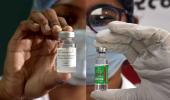The Union government's role and the prices announced by the vaccine makers raises far too many disquieting questions, observes Prosenjit Datta.

What is the total cost to the government of vaccinating everyone in India? The calculation is straightforward, but the answer varies a lot depending on the assumptions you make.
We know that our total population is roughly 135 crore (1.35 billion), and our adult population (over 18 years of age) would be somewhere between 85 crore and 90 crore (850 million and 900 million).
According to reports, the Union government was buying Covishield vaccine doses for Rs 150 from Serum Institute of India so far. While there was some confusion about the price it would charge the government henceforth, the Union government's ministry of health clarified it would still pay Rs 150 per dose to SII and then supply it free to the state governments.
The price it pays for Bharat Biotech's Covaxin, according to the release by the company, is the same.
Now if we assume 90 crore adults will require two doses each, the number of doses required is 180 crore (1.8 billion). Multiplying 180 crore doses with Rs 150 per dose takes us to Rs 27,000 crore (Rs 270 billion).
Interestingly, this represents a good Rs 8,000 crore (Rs 80 billion) -- or a shade over $1.06 billion -- savings on the Rs 35,000 crore (Rs 35 billion) that Finance Minister Nirmala Sitharaman told us has been allocated for the vaccination programme this year. And she had also said that if more money was needed, it would be found.

So far, the Union government has not actually come out and said why it doesn't want to vaccinate everyone. What it has said is that vaccine manufacturers should keep half their production capacities for the Union government and use the rest to supply state governments and private hospitals at prices that they announce.
Naturally, this seems to indicate that the Union government now wants to vaccinate only half the adult population in the country through its own budgets. That means, it probably intends to spend just Rs 13,500 crore (Rs 135 billion) from its original allocated Rs 35,000 crore and leave the rest of the vaccination to the state governments and private individuals. That would save it a whopping Rs 21,500 crore (Rs 215 billion) while adding to state budgets and those of individuals.
But then, states will have to pay considerably more if they vaccinate the rest of the people through their own budgets. That is because SII intends to charge them Rs 400 per dose, while BB will charge the states Rs 600 per dose.
If all states buy only from SII, they would collectively end up forking out not the Rs 13,500 crore the Union government is spending to vaccinate 45 crore (450 million) adults but Rs 36,000 crore (Rs 360 billion) for exactly the same number of people.
But then they cannot only buy from SII because the company does not have the capacity to supply the whole amount. So they would need to buy some amount from BB as well. But BB costs even more.
If the states were to vaccinate even 10 crore (100 million) adults using the BB vaccine, they would end up paying Rs 12,000 crore (Rs 120 billion) for those doses. Another 35 crore vaccinated using the SII vaccine would total Rs 28,000 crore (Rs 280 billion). So their bill jumps up to Rs 40,000 crore (Rs 400 billion).
The more BB vaccines they use, the more their cost goes up.
On the other hand, the Union government remains pretty happy because it is saving a lot from the amount it had originally allocated. It is saving Rs 22,500 crore (Rs 225 billion), no small amount in the economy.

There are three questions that crop up?
Why did the government change its mind about spending the entire money it had initially budgeted?
And two, why are the costs to state governments and private hospitals so much more than what it costs the Union government?
And finally, why do two vaccines that the Union government is buying for exactly the same amount -- Rs 150 per dose -- cost so dramatically different for state governments and private hospitals?
That is, why does a vaccine that the Union government pays Rs 150 for end up being priced at Rs 400 to the state government while another one that also costs Rs 150 to the Union government costs Rs 600 to the state governments.
Private vaccine producers are in the business of making profits whether they are in India or abroad. What is less clear is the exact motivation of the Union government in giving the green signal to these prices.
Many people on social media make the argument that in free markets, private companies can price as they wish or whatever the market is willing to pay. That is a slightly specious argument because when the regulator and the government controls the players by allowing only a few into the market though many others are waiting on the sidelines, it changes the rules of the game.
From being a true free market play, it becomes a government sanctioned duopoly or oligopoly (assuming Sputnik V comes to the market soon). And that is not a great thing for the citizens.
Prosenjit Datta is a former editor of Business Today and Businessworld. He is the founder and editor of Prosaicview, an editorial consultancy, where this column first appeared.
Feature Presentation: Ashish Narsale/Rediff.com










